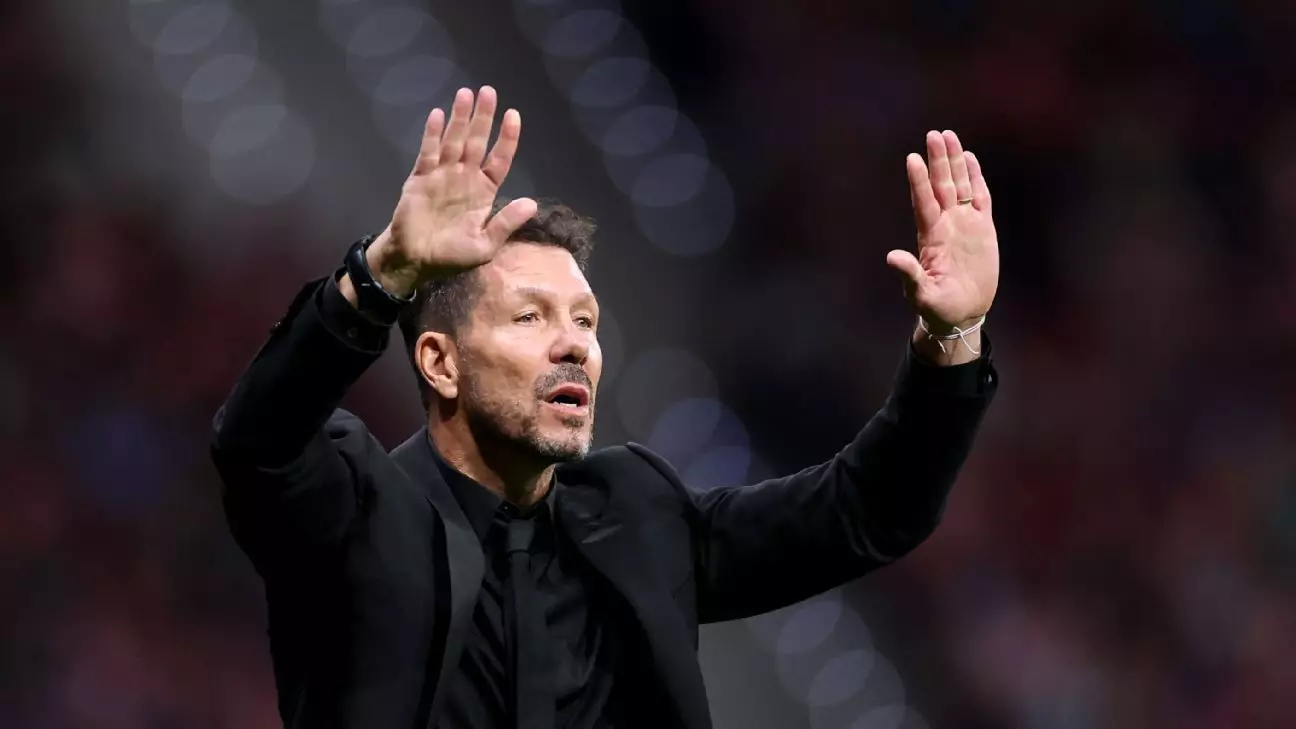In the world of football, emotions run high, especially during intense rivalries like the Madrid derby between Atlético Madrid and Real Madrid. However, recent events from a LaLiga match not only spotlighted on-field performances but also revealed troubling pulse points regarding fan conduct, athlete responsibility, and the overall integrity of the sport.
The highly anticipated match witnessed a chaotic turning point when Atlético fans disrupted gameplay by hurling objects onto the pitch. Such actions are not isolated incidents but symptomatic of a larger cultural issue within some sections of fandom. As the game progressed and tensions escalated, a full spectrum of emotions erupted, culminating in a 20-minute suspension. The underlying reasons for such extreme reactions may be attributed to a convergence of long-standing rivalries, player conduct, and the passionate nature of the fans.
At the heart of Simeone’s critique was the idea that players must be aware of their entourages and the atmosphere they cultivate. After Real Madrid took the lead courtesy of Éder Militão’s goal, Real’s goalkeeper Thibaut Courtois celebrated with such exuberance that it allegedly provoked a hostile response from the stands. This raises pertinent questions: to what extent should players moderate their celebrations to maintain decorum? In an environment steeped in fervor, it is crucial that all protagonists exercise patience and understanding to ensure the game remains a spectacle, rather than a battleground.
Simeone’s statements following the match drew attention to the responsibility fans have not only to their teams but also to the broader sport. His emphasis on not condoning the behavior while also understanding factors that contribute to it presents a kaleidoscopic view of the issue. For some fans, the act of throwing objects could stem from provocation and emotional surges triggered by the game itself. However, irrespective of the underlying motives, such actions risk tarnishing the image of their beloved club and lead to stricter regulations and sanctions—a disproportionate burden on the many who support their teams correctly.
Atlético Madrid’s subsequent statement highlighted an active response to the delinquents’ actions, asserting their commitment to the safety and enjoyment of football. This approach signifies that clubs acknowledge the significance of maintaining a positive environment for players and spectators. Their collaboration with law enforcement to identify the wrongdoers speaks to a genuine understanding of the repercussions incited by such disruptive behavior. Equally, it underscores the necessity for clubs to communicate expectations clearly to their fan base.
It is essential to evaluate the implications of these events in the light of fair play and sportsmanship. An encounter like the Madrid derby is grounded in competitiveness, and any divergence from the principles of fair play erodes the credibility of the league. Post-match discussions by both coaches exemplified an approach focused on mutual respect and sportsmanship. Ancelotti’s endorsement of the referee’s decision to suspend play was heartfelt. His acknowledgment that while no one wanted to stop the match, the circumstances merited it, illustrates a broader commitment to the safety and integrity of the match.
The collaboration between management, players, and fans to promote a safer environment speaks volumes about the need for unity within football. Clubs must champion values that go beyond mere victory; they should cultivate respect, love for the game, and emotional self-regulation. Education, dialogue, and understanding between fans and athletes are crucial to fostering a positive atmosphere that can defuse tensions before they escalate.
The events from the Madrid derby remind us that the world of football is as much about the individual brilliance on the pitch as it is about collective behavior off it. As clubs, players, and fans navigate the complexities of passion and emotion, it becomes apparent that a more profound commitment to responsibility is needed. Only through collaborative efforts can football thrive both as a sport and a community, preserving its essence amid the undeniable challenges posed by fervent rivalries and the ever-looming presence of aggression among spectators. The task ahead is not just stopping the sporadic incidents, but fostering a pervasive culture of respect, understanding, and sportsmanship that radiates through every layer of the game.

